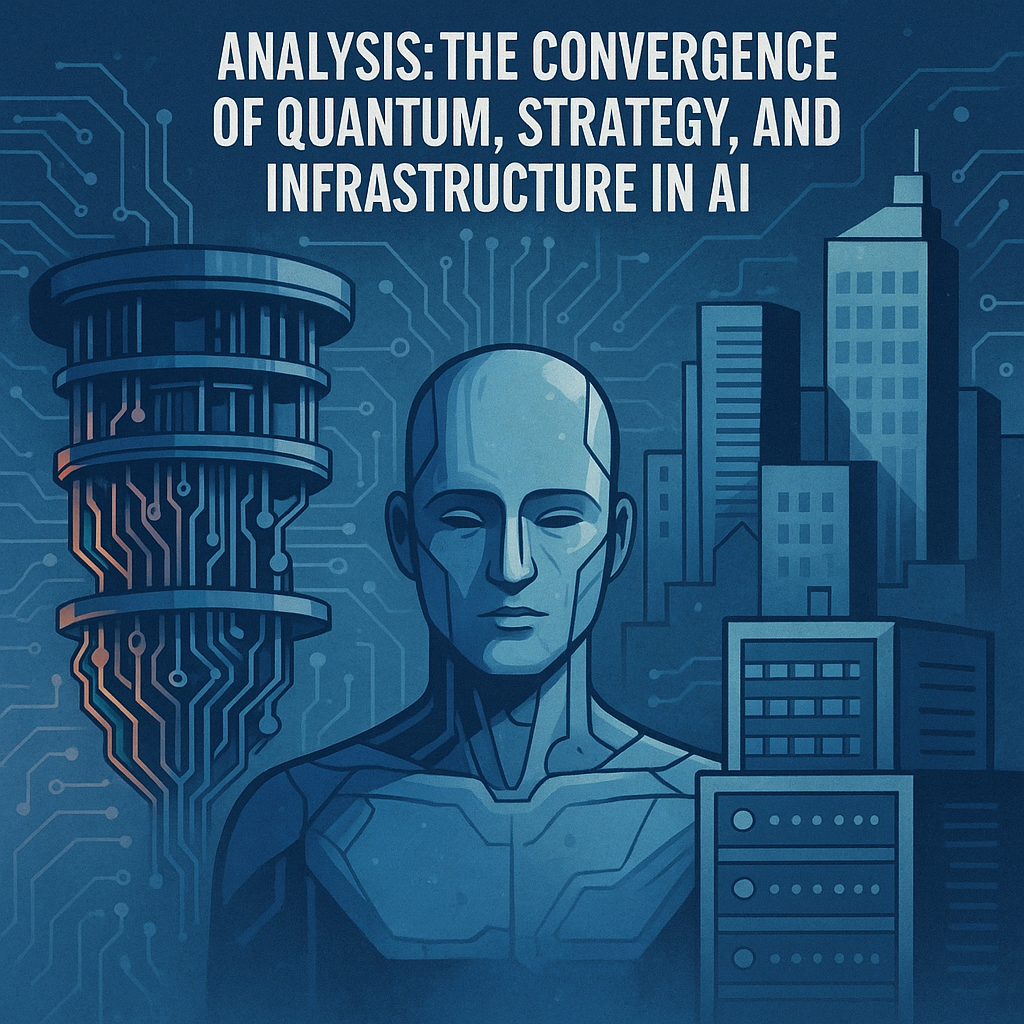Google's quantum computing breakthrough achieves a 13,000x speed boost for AI, revolutionizing drug discovery and materials science by enabling unprecedented precision in molecular simulations. Unlock faster innovation by leveraging quantum-verified datasets for AI training, significantly accelerating the development of more effective AI tools. Discover how quantum computing is no longer theoretical, but a practical solution for tomorrow's AI challenges.
Google's Quantum Advantage: A 13,000x Speed Boost for AI
The AI landscape in 2025 is being reshaped not just by software advancements, but also by groundbreaking hardware innovations, and Google is making waves with its quantum computing breakthroughs.
Quantum Supremacy Achieved: A 13,000x Leap
Google has announced a verifiable quantum advantage with its new Quantum Echoes algorithm, running on its advanced Willow chip. This isn't just incremental progress; it's a quantum leap. The algorithm achieved an astounding 13,000-fold speed increase compared to even the most powerful classical supercomputers when performing complex molecular structure computations. This achievement marks the first time an algorithm has been verifiably executed on quantum hardware, demonstrably outperforming classical systems in a practical application.
"This is a watershed moment. We're not just talking about theoretical possibilities anymore. We're seeing real-world problems being solved at speeds previously unimaginable," - Dr. Eleanor Vance, Lead Researcher, Google Quantum AI.
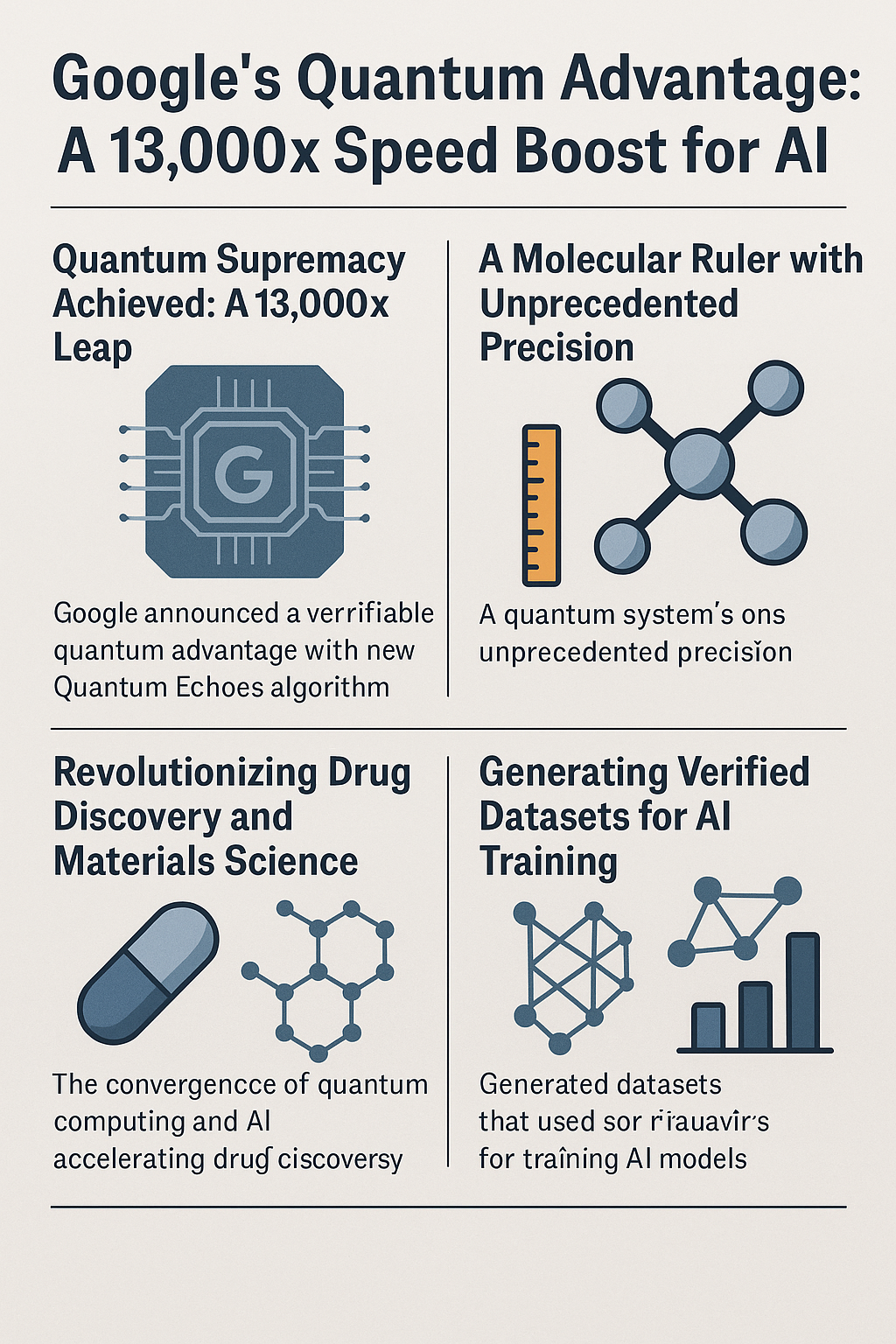
This breakthrough is built upon Google's development of an out-of-order time correlator (OTOC) algorithm. This cutting-edge algorithm demonstrates the ability to learn complex structures from molecules, all the way up to black holes, showcasing its adaptability and scalability. The implications of such a system learning patterns from the smallest to the largest objects in the universe are hard to overstate.
A Molecular Ruler with Unprecedented Precision
Beyond speed, Google's quantum system also boasts unprecedented precision. It's capable of measuring molecular distances with accuracy previously unattainable, essentially acting as a "molecular ruler." This level of detail opens doors to understanding molecular interactions and properties with far greater clarity, which has significant implications in several areas.
Revolutionizing Drug Discovery and Materials Science
The convergence of quantum computing and AI is particularly exciting. The most immediate impact of this breakthrough will likely be felt in drug discovery and materials science. Imagine being able to simulate the behavior of a drug molecule interacting with a protein target with pinpoint accuracy, drastically accelerating the identification of promising drug candidates. Or designing new materials with specific properties – stronger, lighter, more conductive – by simulating their atomic structure at the quantum level. This could transform industries reliant on material innovation.
For instance, AI tools like DeepMind AlphaFold is already revolutionizing structural biology by predicting protein structures with remarkable accuracy. Now, imagine pairing this with Google's quantum computing power; the potential for accelerated discovery and development is immense.
Generating Verified Datasets for AI Training
Another crucial benefit is the creation of new, verified datasets specifically for AI training in the life sciences. With the ability to perform accurate and rapid quantum simulations, Google is generating datasets that can be used to train AI models. These models can then predict molecular properties, screen drug candidates, and design novel materials. In this way, quantum computing is indirectly accelerating improvements to AI tools.
The advancements made with Google’s quantum program are a powerful demonstration of the growing synergy between quantum computing and AI. This is not just about faster computation; it's about opening up new avenues of scientific inquiry and accelerating the development of AI systems capable of tackling the most complex challenges.
Meta's AI Restructuring: Job Cuts and a Focus on Superintelligence
The AI landscape is in constant flux, and even tech giants like Meta are not immune to the need for strategic realignment. Recent news highlights a significant restructuring within Meta's artificial intelligence division, signaling a pivotal shift in their approach to AI development. This move underscores the intense pressure to balance ambitious innovation with practical efficiency in a rapidly evolving field.
Streamlining for Superintelligence: Meta's AI Pivot
Meta recently made the tough decision to eliminate approximately 600 positions within its artificial intelligence division, specifically impacting its Superintelligence Labs. These layoffs have touched both the Fundamental AI Research (FAIR) group, a cornerstone of Meta's long-term research efforts, and its product division, which focuses on translating research into tangible applications. However, reports indicate that the TBD team, responsible for developing superintelligent AI and managing Large Language Models (LLMs) such as Llama, remains largely unaffected, suggesting a continued commitment to these core areas.
The stated goal of this restructuring is to streamline decision-making processes and empower individual contributors with greater responsibility. In essence, Meta appears to be aiming for a more agile and focused AI development ecosystem. This shift can be seen as a response to the complexities of scaling AI initiatives, where sprawling teams and diffused responsibilities can sometimes hinder progress. A tool like TensorFlow, an open-source machine learning framework for building and training models, becomes even more vital in a streamlined environment, allowing focused teams to iterate quickly and efficiently.
Balancing Scale and Efficiency

This restructuring arrives on the heels of substantial investments by Meta in both AI infrastructure, such as their partnership with ScaleAI, and top-tier AI talent acquisition. This juxtaposition highlights the ongoing challenge of balancing ambitious, large-scale AI projects with the need for efficient resource allocation. It suggests that Meta is prioritizing a strategic focus on core superintelligence initiatives, rather than spreading resources across a wider range of projects. This may involve consolidating research efforts, optimizing workflows, and focusing on projects with the highest potential for breakthrough innovation.
Workforce optimization is becoming an increasingly important theme in the AI sector. As AI technologies mature and the competitive landscape intensifies, companies are compelled to reassess their organizational structures and talent investments to ensure they are best positioned for long-term success. Meta's recent actions reflect this broader trend, underscoring the need for adaptability and strategic clarity in the age of AI. You can track the latest trends and talent shifts in the field by visiting our AI News section.
Ultimately, Meta's restructuring signals a calculated bet on the future of AI. By focusing on superintelligence and streamlining its operations, the company aims to stay at the forefront of AI innovation while maximizing the efficiency of its investments. This strategic realignment will be closely watched as Meta continues to navigate the dynamic and competitive world of artificial intelligence.
Alibaba's AI Consumer Push: Quark Chatbot and Wearable AI
The race to dominate the AI consumer market is heating up in China, and Alibaba is making a bold push with its latest AI initiatives. The company is strategically leveraging its existing platforms and venturing into new hardware categories to capture user attention and market share.
Quark Chatbot: Alibaba's AI Assistant
Alibaba has integrated an AI chatbot assistant directly into its Quark app, a move clearly aimed at challenging ByteDance's Doubao and DeepSeek in China's fiercely competitive AI market. The Quark chatbot is powered by Alibaba's own Qwen3 models, offering users a versatile tool for both text and voice-based interactions. This positions Quark as more than just a search engine; it's evolving into a comprehensive AI-powered assistant designed to handle a wide array of tasks, from answering questions to generating creative content. By embedding the chatbot within a popular existing app, Alibaba hopes to seamlessly introduce AI capabilities to a broad user base.
Furthermore, this integration signals a strategic repositioning of Quark as Alibaba's flagship consumer AI application. It's a clear statement that Alibaba is serious about competing in the consumer AI space, and it's betting on Quark to lead the charge.
Quark AI Glasses: Entering the Wearable AI Arena
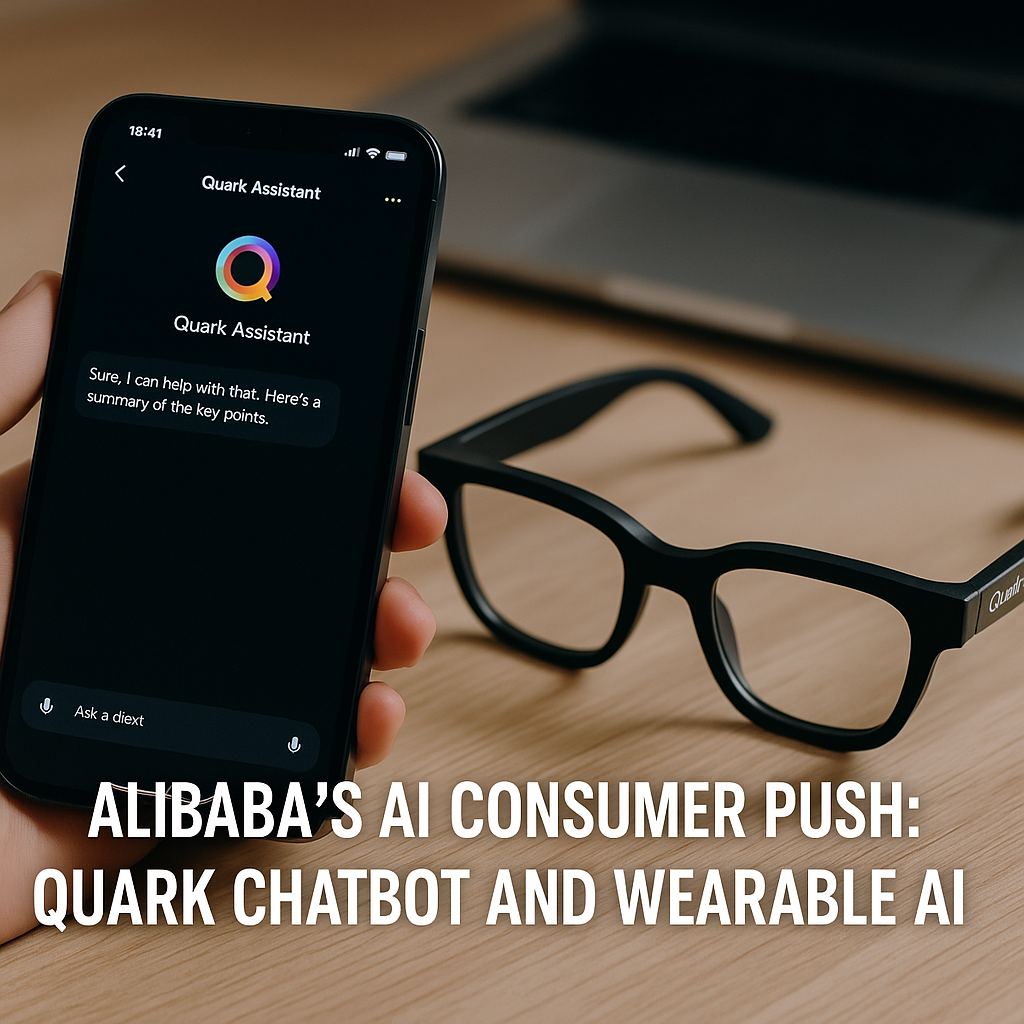
Not content with just software, Alibaba is also diving into the wearable AI device market with the upcoming launch of its Quark AI Glasses. Pre-sales have already begun, marking Alibaba's entry into a product category that promises to blend AI assistance with everyday life. While details remain somewhat limited, the Quark AI Glasses represent a significant step for Alibaba as it seeks to integrate AI into various aspects of the consumer experience.
This move into wearable AI puts Alibaba in competition with other tech giants exploring similar devices, highlighting the growing belief that AI will soon be seamlessly integrated into our clothing and accessories.
Challenges and Opportunities
Alibaba's push into consumer AI isn't without its challenges. The company has traditionally been more focused on enterprise-level cloud services, and transitioning to consumer-facing products requires a shift in mindset and strategy. Building compelling user experiences and effectively marketing AI-powered products to a broad audience will be crucial for success.
However, Alibaba's vast resources, technological expertise, and existing user base provide a strong foundation for its AI ambitions. The Qwen3 models offer a powerful engine for its AI applications, and the Quark app provides a ready-made platform for distribution.
Ultimately, Alibaba's success in the consumer AI market will depend on its ability to innovate, adapt, and deliver truly valuable AI-powered experiences that resonate with users. The integration of AI into Quark and the development of Quark AI Glasses are significant steps in this direction, signaling a new era for Alibaba and the broader AI landscape in China. This ambitious approach will be one to watch as the AI revolution continues to unfold.
OpenAI's UK Data Residency: Adapting to Global Regulations
In a strategic move reflecting the growing importance of data sovereignty, OpenAI is set to offer Britain's government and businesses the option of domestic data storage, signaling a major adaptation to global regulatory pressures. This initiative directly addresses the increasing regulatory and privacy concerns that have, until now, hindered the broader adoption of AI solutions within the UK. After all, trust is paramount.
Data Residency and the Push for AI Adoption
At the heart of OpenAI's decision lies the increasing prevalence of data residency requirements. These mandates stipulate that sensitive information, particularly personal data, must remain within a country's borders. This is particularly important for organizations operating in regulated sectors, such as healthcare and finance. By providing local data storage, OpenAI aims to unlock AI adoption in these critical areas, ensuring compliance with UK laws and fostering greater trust in its AI technologies.
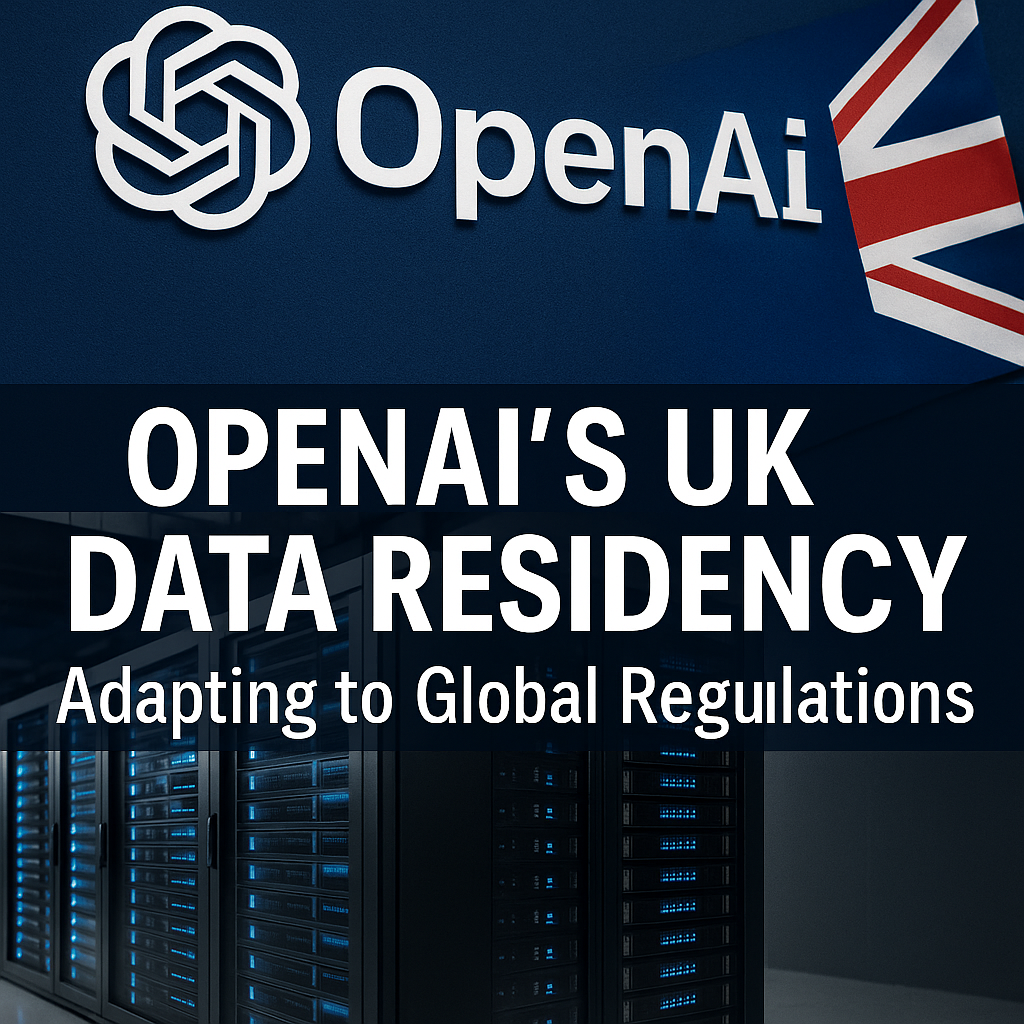
Furthermore, OpenAI's move reflects a broader trend towards sovereign AI infrastructure arrangements. Governments worldwide are increasingly seeking greater control over their data and AI resources, viewing them as strategic assets. This can involve local data centers, AI model development within national boundaries, and partnerships with domestic tech companies. OpenAI’s strategy can also be seen as a way to deepen partnerships with governments worldwide, recognizing that AI's future hinges on collaborative and compliant ecosystems.
Navigating Data Privacy and Global Scrutiny
OpenAI, along with other major AI players, has faced increasing scrutiny over its data handling practices. Concerns about data privacy, security, and the potential misuse of AI have led to stricter regulations and greater public awareness. The European Union's General Data Protection Regulation (GDPR), for example, has set a high bar for data protection standards.
This is further compounded by data localization mandates, which are becoming increasingly common around the globe. These mandates often require companies to store and process data within a specific country's borders, regardless of where the company itself is based. By establishing a UK data residency option, OpenAI is taking a proactive step to comply with these evolving requirements and demonstrate its commitment to responsible AI development. Tools like ChatGPT, OpenAI’s flagship product, will benefit from increased accessibility within the UK market.
Ultimately, OpenAI's decision to offer UK data residency highlights the intricate interplay between technological innovation, regulatory compliance, and national interests. It underscores the importance of adapting to local requirements and building trust with governments and users alike. As AI continues to evolve, expect to see more companies embracing similar strategies to navigate the complex landscape of global AI governance, which is discussed frequently in AI News.
Nokia's AI-Driven Infrastructure Surge: The Backbone of AI Deployment
Imagine the AI revolution as a bustling metropolis – a city of algorithms, data, and endless possibilities. But what good is a city without robust roads, power grids, and communication networks? That's where companies like Nokia come in, playing a pivotal role in laying the groundwork for AI's ambitious future. Their recent surge in network infrastructure sales, fueled by the insatiable demands of AI and cloud customers, paints a clear picture: the AI boom isn't just about software; it's fundamentally about hardware too.
The Unsung Hero: Telecommunications Infrastructure
At its core, AI deployment hinges on the seamless transfer of massive datasets. Whether it's training a large language model like ChatGPT or running complex simulations, AI workloads demand bandwidth and low latency that can only be delivered by cutting-edge telecommunications infrastructure. Think of it as the circulatory system of the AI body, ensuring that data flows efficiently to the right places at the right time. Without it, AI innovation grinds to a halt.
Cloud Providers and the Capacity Crunch
Cloud providers, like Google Cloud AI, are on the front lines of t
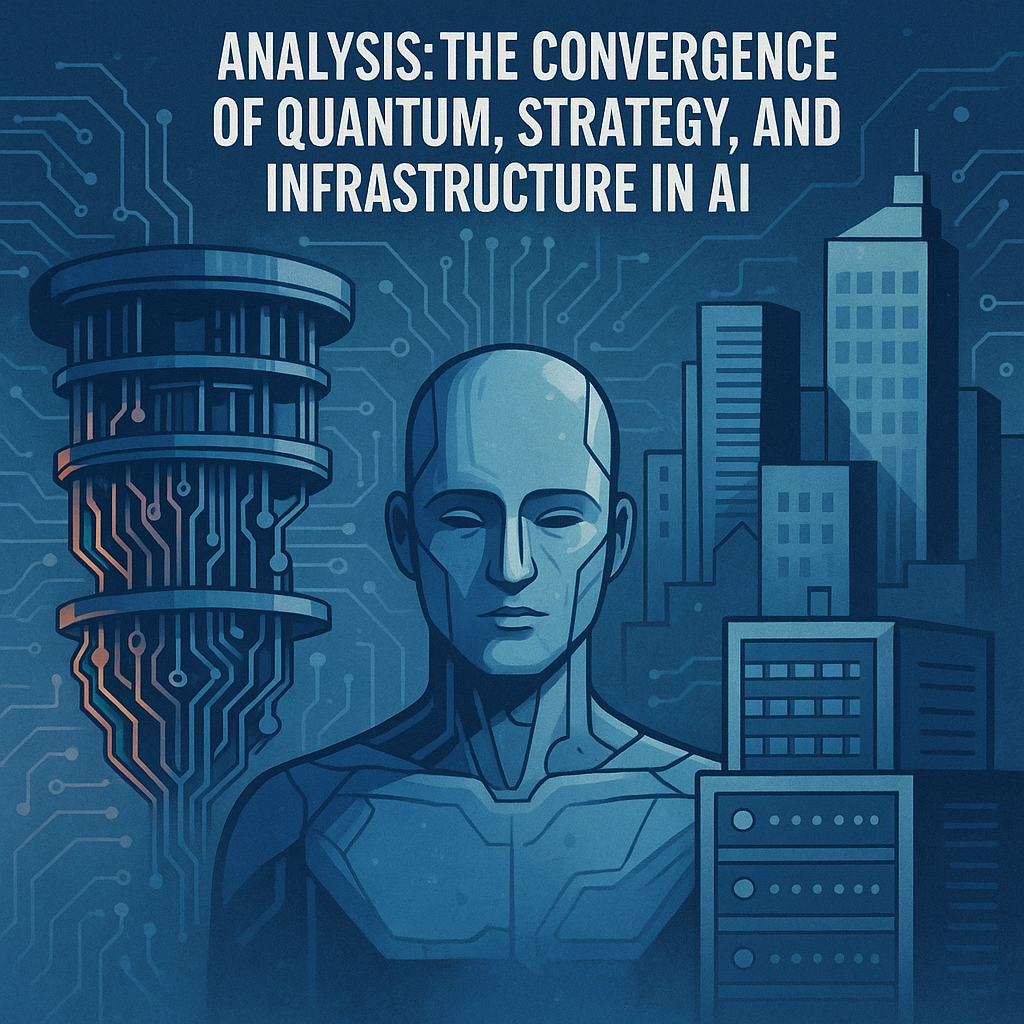
his infrastructure build-out, and they are rapidly expanding their capacity to handle the ever-increasing demand for AI-driven services. Enterprises, too, are recognizing the need to bolster their own infrastructure to support in-house AI initiatives. This surge in demand creates a multi-billion dollar opportunity for equipment manufacturers who can provide the necessary hardware to power these AI workloads.
Network Upgrades: A Necessity, Not a Luxury
Deploying AI at scale isn't a simple software update; it necessitates substantial upgrades to existing telecommunications networks. From faster fiber optic cables to more powerful data centers, the physical infrastructure must evolve to keep pace with the computational demands of AI. This is not merely a technological challenge but a significant investment opportunity, requiring strategic planning and substantial capital allocation.
The Bottom Line: Investing in the Foundation
The rise of AI is reshaping the technological landscape, and at the heart of this transformation lies the often-overlooked realm of physical infrastructure. Nokia's success serves as a bellwether, signaling a sustained period of investment in telecommunications networks. For cloud providers, enterprises, and equipment manufacturers alike, understanding and capitalizing on this trend is crucial to unlocking the full potential of AI. As we continue pushing the boundaries of what AI can achieve, it's essential to remember that these advancements rest on the solid foundation of robust and reliable infrastructure.
Analysis: The Convergence of Quantum, Strategy, and Infrastructure in AI
The AI landscape in 2025 is being shaped by forces converging from seemingly disparate fields: quantum computing, strategic corporate realignments, market realities, and infrastructural necessities. What might seem like isolated events are, in fact, interconnected pieces of a larger puzzle that defines the current state and future trajectory of AI. Let's break down how these areas are influencing the AI ecosystem.
Quantum Computing: From Theory to Reality
For years, quantum computing has been the stuff of science fiction and highly theoretical research. Now, it's inching closer to practical application, and the implications for AI are profound. Quantum computers, with their ability to perform complex calculations at speeds unattainable by classical computers, promise to revolutionize machine learning. Imagine training complex AI models in a fraction of the time or cracking encryption that currently protects sensitive data. While widespread adoption is still some years away, the early progress in quantum computing is already influencing AI research and development. This progress may allow you to train advanced AI models through tools such as Google Cloud AI.
Strategic Shifts: Meta's Layoffs and Focus
Corporate strategies are also playing a critical role. Meta's recent layoffs, while seemingly negative, reflect a strategic pivot. Rather than spreading resources thinly across numerous projects, the company is consolidating its efforts around key AI initiatives. This shift towards strategic focus signals a maturing AI market where efficiency and ROI are becoming paramount. It's no longer enough to simply explore AI; companies must demonstrate tangible value and profitability, potentially by utilizing a tool such as Salesforce Platform.
Market Realities: Alibaba's Consumer AI Struggles
On the other hand, Alibaba's challenges in the consumer AI space highlight the harsh realities of the market. Despite significant investment, the company has struggled to gain traction, underscoring the difficulty of translating technological prowess into commercial success. This serves as a cautionary tale, emphasizing the need for AI solutions to address genuine customer needs and pain points.
Infrastructure Demands: Data Residency and Physical Realities
Finally, the AI revolution is running headfirst into the physical world. OpenAI's increasing focus on data residency reflects growing concerns about data privacy and regulatory compliance. Similarly, Nokia's infrastructure demands emphasize the critical importance of robust and reliable networks to support the ever-increasing data flows associated with AI. These examples highlight the fact that AI is not just about algorithms and code; it also requires a solid foundation of hardware and infrastructure.
In summary, the convergence of quantum breakthroughs, workforce optimization, market consolidation, and infrastructure demands is fundamentally reshaping the AI landscape. Companies that can successfully navigate these challenges will be best positioned to thrive in the years to come. It’s a delicate balance: staying at the cutting edge of innovation while maintaining operational efficiency and adhering to increasingly complex regulatory frameworks. To stay informed about the most recent market trends, keep an eye on AI News.
🎧 Listen to the Podcast
Hear us discuss this topic in more detail on our latest podcast episode: https://open.spotify.com/episode/0hEWpnTntullE2oHTgCPwp?si=4ln1iFYoSnOkzjptO0fFhA
Keywords: Artificial Intelligence, AI, Quantum Computing, Data Residency, AI Infrastructure, AI Market, Google Quantum Advantage, Meta AI Layoffs, Alibaba AI Chatbot, Nokia AI Demand, OpenAI UK Data, Superintelligence, AI Regulation, AI Chip Technology, AI and Cloud Infrastructure
Hashtags: #AI #ArtificialIntelligence #QuantumComputing #TechNews #Innovation
For more AI insights and tool reviews, visit our website https://best-ai-tools.org, and follow us on our social media channels!
Website: https://best-ai-tools.org
X (Twitter): https://x.com/bitautor36935
Instagram: https://www.instagram.com/bestaitoolsorg
Telegram: https://t.me/BestAIToolsCommunity
Medium: https://medium.com/@bitautor.de
Spotify: https://creators.spotify.com/pod/profile/bestaitools
Facebook: https://www.facebook.com/profile.php?id=61577063078524
YouTube: https://www.youtube.com/@BitAutor
